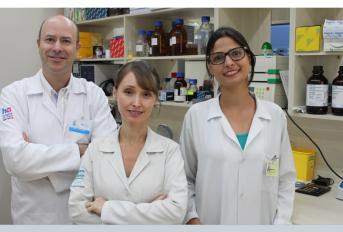Associação Portuguesa de Investigação em Cancro
Eufol, um triterpeno tetracíclico obtido da Euphorbia tirucalli, induz autofagia e sensibiliza células de glioblastoma à citotoxicidade da temozolomida
Eufol, um triterpeno tetracíclico obtido da Euphorbia tirucalli, induz autofagia e sensibiliza células de glioblastoma à citotoxicidade da temozolomida

A pesquisa que foi desenvolvida no Hospital de Câncer de Barretos (Brasil) em colaboração com o ICVS da Universidade do Minho, foi uma parceria com a empresa Amazônia Fitomedicamentos Ltda e revelou mecanismos de ação envolvidos na citotoxicidade promovida pela molécula eufol, obtida a partir da biodiversidade brasileira, em células de glioblastoma. Um destes mecanismos foi a indução de processo autofágico, que também contribuiu, em parte, para potencializar o efeito do quimioterápico utilizado na prática clínica, a temozolomida. Além disso, a administração de eufol inibiu proliferação e migração celular in vitro, além de apresentar efeito antitumoral e antiangiogênico in vivo, no modelo de membrana corioalantoide de galinha. Estes resultados sugerem eufol como um novo agente antineoplásico que também tem potencial terapêutico para o tratamento adjuvante do cancro.
Autores e afiliações:
Viviane A. O. Silva1; Marcela N. Rosa1; Vera Miranda-Gonçalves2,3; Angela M. Costa 2,3; Aline Tansini1; Adriane F. Evangelista1; Olga Martinho1,2,3; Adriana C. Carloni1; Chris Jones 4,5; João Paulo Lima6; Luiz F. Pianowski7; Rui Manuel Reis1,2,3
1 Molecular Oncology Research Center, Barretos Cancer Hospital, Barretos, São Paulo 14784 400, Brazil
2 Life and Health Sciences Research Institute (ICVS), School of Medicine, University of Minho, 4710-057 Braga, Portugal
3 ICVS/3B’s - PT Government Associate Laboratory, 4806-909 Braga, Guimarães, Portugal
4 Division of Molecular Pathology, The Institute of Cancer Research, London, UK
5 Division of Cancer Therapeutics, The Institute of Cancer Research, London, UK
6 Medical Oncology Department, AC Camargo Cancer Center, São Paulo 01509-010, Brazil
7 Kyolab laboratório de pesquisa Farmacêutica Ltda, Valinhos, São Paulo 13273-105, Brazil
Abstract:
Glioblastoma (GBM) is the most frequent and aggressive type of brain tumor. There are limited therapeutic options for GBM so that new and effective agents are urgently needed. Euphol is a tetracyclic triterpene alcohol, and it is the main constituent of the sap of the medicinal plant Euphorbia tirucalli. We previously identified anti-cancer activity in euphol based on the cytotoxicity screening of 73 human cancer cells. We now expand the toxicological screening of the inhibitory effect and bioactivity of euphol using two additional glioma primary cultures. Euphol exposure showed similar cytotoxicity against primary glioma cultures compared to commercial glioma cells. Euphol has concentration-dependent cytotoxic effects on cancer cell lines, with more than a five-fold difference in the IC50 values in some cell lines. Euphol treatment had a higher selective cytotoxicity index (0.64–3.36) than temozolomide (0.11–1.13) and reduced both proliferation and cell motility. However, no effect was found on cell cycle distribution, invasion and colony formation. Importantly, the expression of the autophagy-associated protein LC3-II and acidic vesicular organelle formation were markedly increased, with Bafilomycin A1 potentiating cytotoxicity. Finally, euphol also exhibited antitumoral and antiangiogenic activity in vivo, using the chicken chorioallantoic membrane assay, with synergistic temozolomide interactions in most cell lines. In conclusion, euphol exerted in vitro and in vivo cytotoxicity against glioma cells, through several cancer pathways, including the activation of autophagy-associated cell death. These findings provide experimental support for further development of euphol as a novel therapeutic agent for GBM, either alone or in combination chemotherapy.
Revista: Investigational New Drugs
Link: https://link.springer.com/article/10.1007%2Fs10637-018-0620-y




